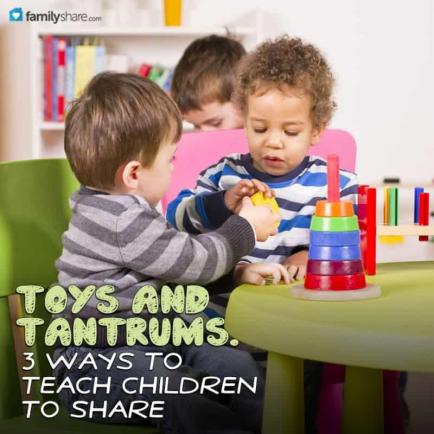
Picture this: It's Wednesday, and you're at the playground with your little boy, "Johnny." You both look forward to Wednesdays because that's your special day together. Today, though, Johnny is extra excited because he gets to play with his brand new "sand mover"� he's been waiting two whole days to use it. He's squirming in his car seat as you park the car, and finally he's free to spend hours transporting sand and getting messy.
About 15 minutes into his bliss, a new kid comes up and starts oohing and ahhhing over your son's sand mover. He just has to get his hands on that shiny new toy - or else. The new kid's mom didn't bring any other toys for him to play with, and even though you offer up some of Little Johnny's back-up toys, the new boy doesn't want them. He's now in full tantrum mode, and his mom is not doing a thing to make it stop. What are you supposed to do? Do you force Little Johnny to give up his most prized possession or do you let him keep enjoying the toy he's waited a lifetime (in toddler time) to play with? I mean, it is always better to give then to receive, right? And weren't we taught to sacrifice our things and give to those who appear to have less?
According to Dictionary.com, sharing means "to divide, apportion, or receive equally."� If Johnny were still thoroughly enthralled with his sand mover and you made him give it up against his wishes just so the new boy would stop throwing a fit, is that technically "sharing?"� To Johnny, that's going to feel more like the end of the world as he knows it. He'll likely start throwing a fit of his own and then one of two things could happen next: you'll have to pack it up, cut your special time together short and head home to avoid any more embarrassment or bad behavior; or Little Johnny will get scolded for not sharing his sand mover.
So what is a good way to make the new boy stop crying, letting Little Johnny continue playing with this favorite toy and keeping all the rest of the moms, dads and kids in the sandbox sane? Is it really possible to make sure everyone's needs are met in a situation like this without having to leave or resort to punishment? Here are a few simple strategies to help keep all the kids in the sandbox playing nicely together:
Talk it out
No matter what ages our kids are, it's never too early (or too late) to start fostering in them the habit of speaking their truth in love and with respect. Let's say Johnny still wanted to play with his sand mover, and he wasn't quite ready to give it up. Why not offer him a few alternatives and let him choose what would work best for everyone involved?
For example, ask him if he would like to go swing while the new boy borrows his mover. Or what if you showed Johnny and the new boy how to play with the toy together and asked Johnny if he would be OK with that? That way no one has to make sacrifices or go without, and Johnny might just make a new friend in the process. You could even offer Johnny the toy that was his favorite before he got the sand mover and ask him if the new boy could enjoy the coveted "mover"� for a bit. Whatever the outcome may be, allowing Johnny to help make the decision will help him learn how to resolve problems, speak his truth and create healthy boundaries.
Teach children that cheerful giving comes from the heart
Giving and sharing are designed to be rewarding for both the giver and the receiver - not just the receiver. When Little Johnny is able to make the choice to share rather than being forced to give up something, he will likely feel empowered and could even be eager to let someone else enjoy his favorite toy as much as he does. Continually forcing him to share or punishing him for not sacrificing what he's enjoying often results in tantrums and potentially sets the stage for a lifetime of low self-esteem and negative behaviors. That's why creating a space for cheerful giving through communication during the decision-making process is the healthiest way to go, even if it means having to listen to the new boy's tantrum in the sandbox for a few extra minutes.
Love wins
Just like with anything new, it may take a few times of being in these types of situations to remember to act rather than react. By taking the time to talk it out and to allow Johnny to be a problem-solver and cheerful giver, you'll be investing not only in having peace in the current moment, but you'll also be shaping his values, his integrity and his ability to see situations from other people's perspectives. And Johnny will also learn that when he gives, he will always receive something in return even if that something doesn't come right away. Cheerful giving results in joy and peace which is far more rewarding than resentment. After all, what goes around comes around"�always.

